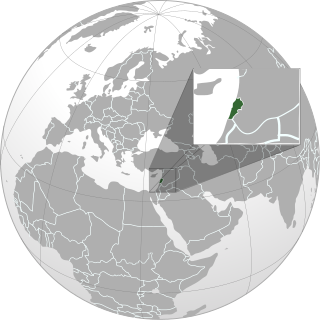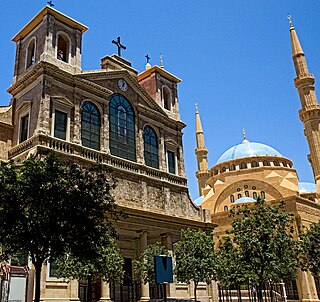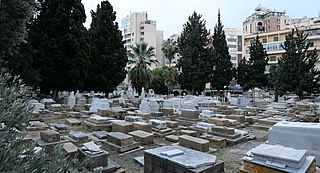
Wadi Abu Jamil is the former Jewish quarter in Beirut, Lebanon, located in the city's central district.

Wadi Abu Jamil is the former Jewish quarter in Beirut, Lebanon, located in the city's central district.
Formerly known as Wadi al-Yahoud (meaning "Valley of the Jews"), [1] the quarter was the center of the Lebanese Jewish community, with Beirut's largest and most important synagogue, the Maghen Abraham Synagogue, located there. The neighborhood was home to Lebanon's centuries-old Jewish community and also for the more recent Jewish refugees from Syria and Iraq.
Emigration from the community began in earnest after the 1967 Arab-Israeli war. During the 1982 Lebanon War, Yasir Arafat's PLO forces took over much of the neighborhood, which was located along the dividing line between the two sides of the Lebanese Civil War. During the war, Israeli bombardment damaged the Maghen Abraham Synagogue.

The area today is home to around 29 Lebanese Jews, mostly elderly.[ citation needed ]
Renovation of the Maghen Abraham Synagogue began in the summer of 2009. [2] Funding for the renovation includes donations from the Lebanese Jewish Community Council and Jewish Lebanese living overseas. Isaac Arazi, the leader of the Jewish community in Lebanon has managed to raise $40,000 from private donors. [3] Renovation is estimated to cost between $1 million and $1.5 million. [2] Solidere, the Lebanese joint-stock company responsible for much of Central Beirut’s reconstruction, has donated $150,000 toward the renovation effort. [3] Lebanese architect Nabil Gholam has played an important role in the redevelopment planning process.

Hebron is a Palestinian city in the southern West Bank, 30 kilometres (19 mi) south of Jerusalem. Hebron is capital of the West Bank's largest governorate, known as Hebron Governorate. With a population of 201,063 in the city limits, the adjacent metropolitan area within the governorate is home to over 700,000 people. Hebron spans across an area of 74.102 square kilometres (28.611 sq mi). It is the third largest city in the country, followed by Gaza and Jerusalem. The city is often considered one of the four holy cities in Judaism as well as in Islam and Christianity.
The persecution of Jews has been a major event in Jewish history prompting shifting waves of refugees and the formation of diaspora communities. As early as 605 BCE, Jews who lived in the Neo-Babylonian Empire were persecuted and deported. Antisemitism was also practiced by the governments of many different empires and the adherents of many different religions (Christianity), and it was also widespread in many different regions of the world.
Jews in Philadelphia can trace their history back to Colonial America. Jews have lived in Philadelphia since the arrival of William Penn in 1682.

Syrian Jews are Jews who live in the region of the modern state of Syria, and their descendants born outside Syria. Syrian Jews derive their origin from two groups: from the Jews who inhabited the region of today's Syria from ancient times, and sometimes classified as Mizrahi Jews ; and from the Sephardi Jews who fled to Syria after the Alhambra Decree forced the expulsion of the Jews from Spain in 1492.

The history of the Jews in Syria goes back to ancient times. They were joined by a Sephardim who fled after the expulsion of the Jews from Spain and Portugal in 1492 CE. There were large Jewish communities in Aleppo, Damascus, and Qamishli for centuries. In the early 20th century, a large percentage of Syrian Jews immigrated to British Mandate-Palestine, the U.S. and Latin America.

The Maghen Abraham Synagogue is an Orthodox Jewish congregation and synagogue, located in the Jewish district of Wadi Abu Jamil in downtown Beirut, Lebanon.

The history of the Jews in Lebanon encompasses the presence of Jews in present-day Lebanon stretching back to biblical times. While Jews have been present in Lebanon since ancient times, their numbers had dwindled during the Muslim era. Through the medieval ages, Jewish people often faced persecution, but retained their religious and cultural identity.

Beirut, the capital of Lebanon, is home to two hippodromes, a historic one from the Roman era and a modern one that was built in the late 19th century.

Meir Taweig Synagogue, also known as Meir Tweg Synagogue or Me'ir Avraham Taweq Synagogue, is a large Orthodox Jewish congregation and synagogue, located in the historic Jewish quarter of Bataween, in Baghdad, Iraq. The complex comprises the main synagogue of Iraq, a Jewish school, library, and community center.
Congregation Maghen Abraham in Montreal is a Sephardi Jewish Lebanese community located in the district of St-Kévin in Montreal, Quebec, Canada.

Lebanon is an eastern Mediterranean country that has the most religiously diverse society within the Middle East, recognizing 18 religious sects. The recognized religions are Islam, Druze, Christianity and Judaism.

The Bukharan Quarter, also HaBukharim Quarter or Bukharim Quarter, is a neighborhood in the center of Jerusalem, Israel. The neighborhood was established by Bukharan Jews of the Old Yishuv. The neighborhood also anchored communities from modern-day Afghanistan and the Iranian city of Meshad. It belonged to the early Jewish neighborhoods built outside the Old City of Jerusalem as part of a process which began in the 1850s. Today most of the residents are Haredi Jews.

This article deals in more detail with some of the notable synagogues of Jerusalem that do not have their own page as yet.

The Bet Israel Synagogue, also known as the Beit Israel Synagogue, is a Jewish congregation and synagogue located at 265 Mithatpaşa Street, in the Turgut Reis neighbourhood, in the Karataş quarter of the city of İzmir, in the İzmir Province of Turkey. The synagogue was completed in 1907 and is the largest synagogue in the city, the other major synagogue being the Shaar Hashamaym Synagogue.

Jews comprise approximately 10% of New York City's population, making the Jewish community the largest in the world outside of Israel. As of 2020, over 960,000 Jews lived in the five boroughs of New York City, and over 1.9 million Jews lived in the New York metropolitan area, approximately 25% of the American Jewish population.

The Beth Elamen Jewish cemetery, is the only Jewish graveyard in Lebanon's capital Beirut.
Zaki Cohen born in 1829 in Aleppo in the Ottoman Empire, was a Chief Rabbi of the Jewish community in Beirut, Lebanon and a playwright. In 1874, he founded Beirut's first modern Jewish school, called Tiferet Yisrael in Hebrew and al-Madrasa al-Waṭaniyya al-Isrāʾīliyya in Arabic, where he served as director. The school continued to operate until 1899, when it was superseded by College Alliance Israelite Universelle of Beirut. Cohen died in Alexandria in 1904.

The Sidon Synagogue is a former Jewish congregation and synagogue, located in the old city of Sidon in the Jewish neighborhood or quarter known colloquially as ḥarat al-yahūd. The synagogue is one of the oldest synagogues in the world.
The hippodrome of Berytus was a circus in the Roman colony of Berytus. It is one of two hippodromes in Beirut.
Shulamit "Shula" Kishik-Cohen was an Israeli spy who worked to smuggle Jews from Arab countries into Israel. She was noted for her missions in Lebanon and work for the Mossad.